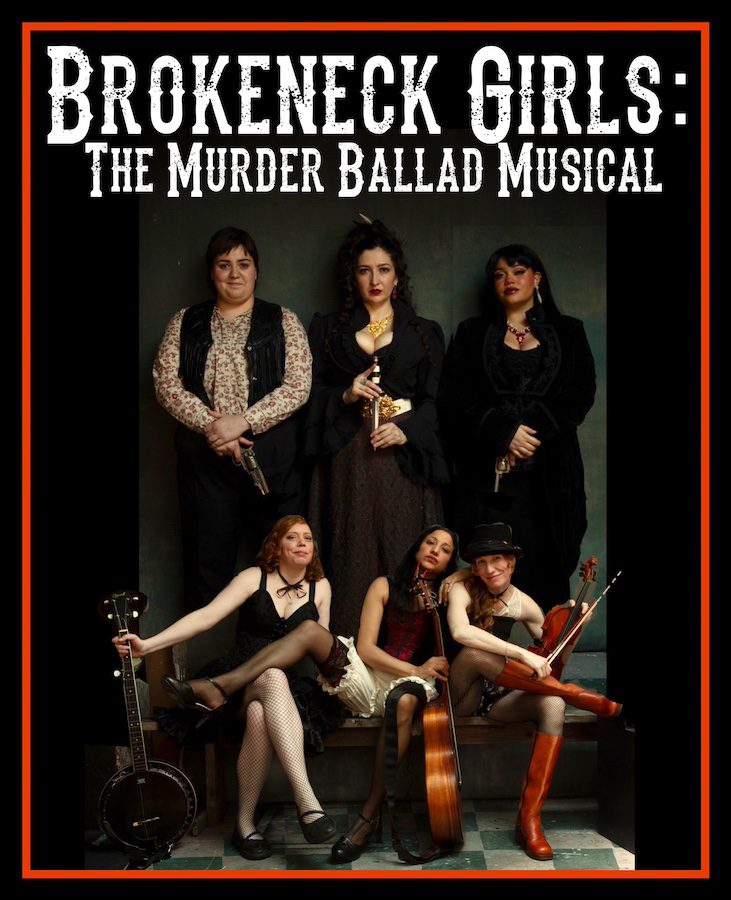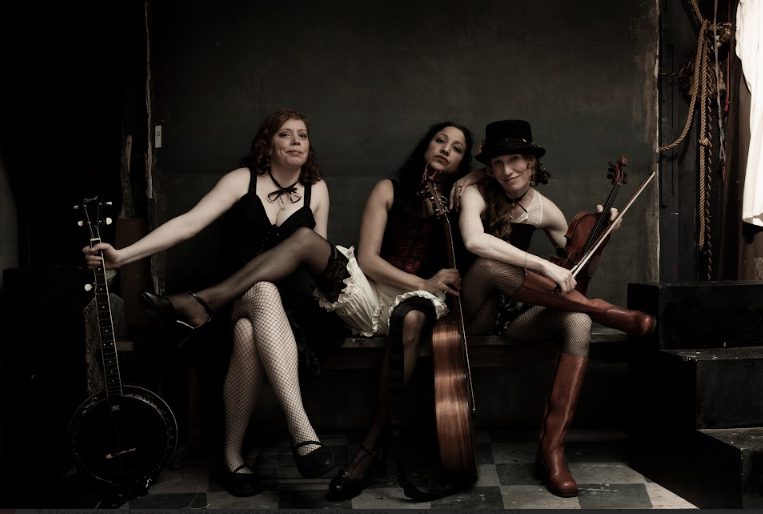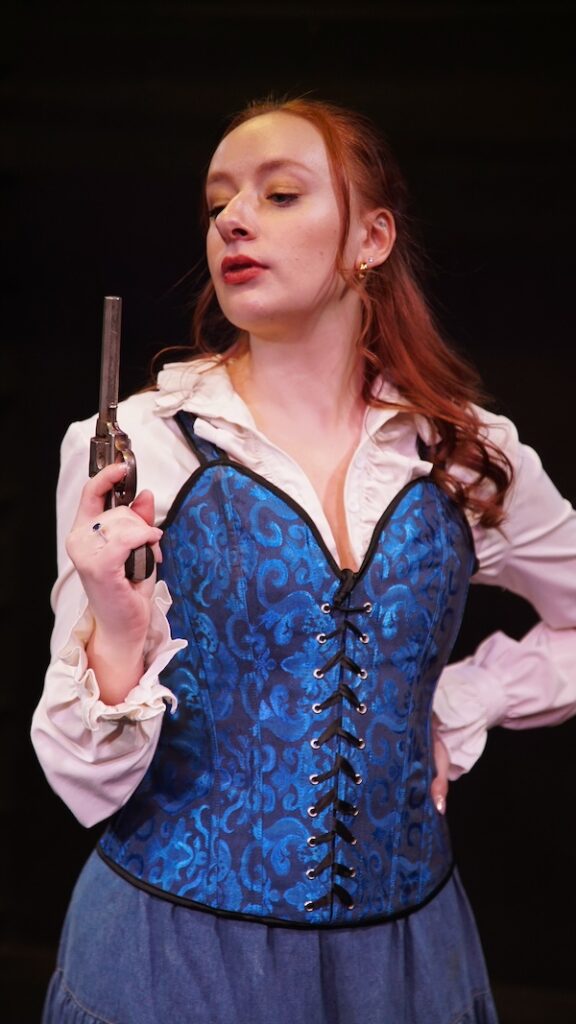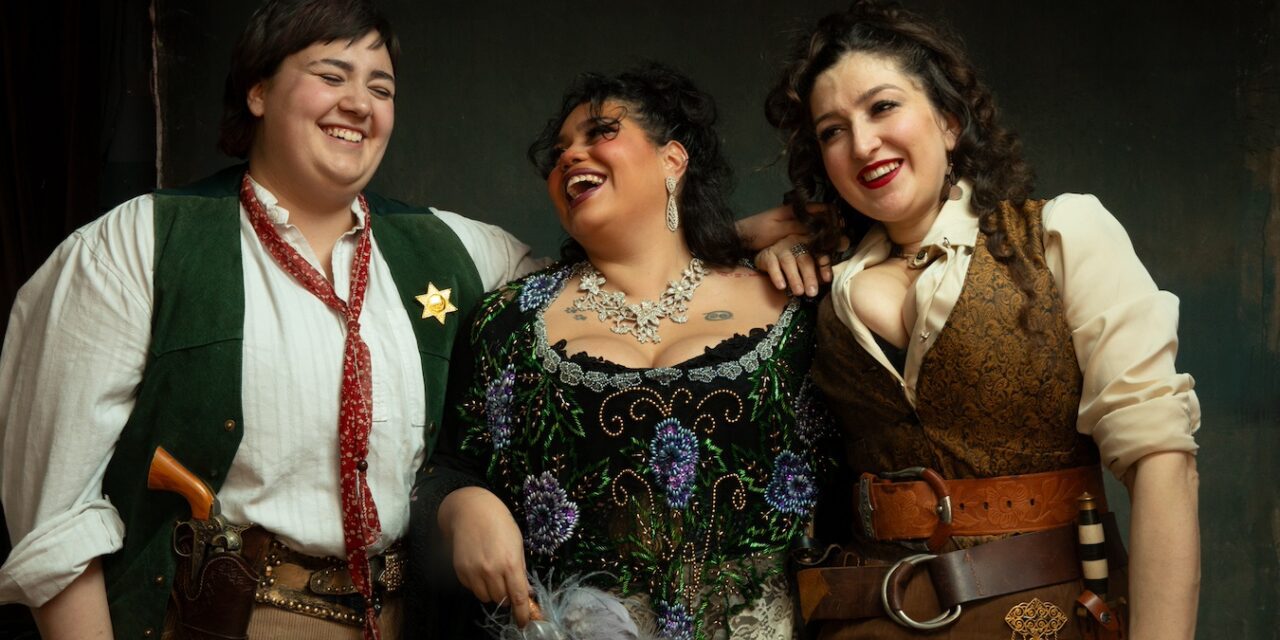Theater Review by Michael Dale . . . .
“I’d rather see you dead, little girl, than to be with another man,” sang John Lennon on The Beatles’ Rubber Soul album, released in 1965 during the height of Beatlemania.
While Lennon was English, the line he used in his lyrics for “Run For Your Life” originated in American rhythm and blues, written and recorded in 1954 by Arthur Gunter for his single “Baby, Let’s Play House,” which was covered by Elvis Presley the next year.
I don’t recall five-year-old me feeling one way or another about the abrasive sentiment expressed in the lyrics (Lennon eventually publicly regretted writing the song), nor do I remember feeling especially repulsed a few years later when the first full song I learned at my after-school guitar lessons was “Tom Dooley,” the traditional folk ballad that expresses sympathy for a “poor boy” who’s going to hang for stabbing his girlfriend to death.

But when the folk noir trio Brokeneck Girls performed “Tom Dooley” as one of the pre-show selections for their NYC Fringe Festival outing, Brokeneck Girls: The Murder Ballad Musical, it was harmonized with mock sorrow from the point of view of a star witness, conveying satisfaction at helping a guilty man get what’s coming to him.
The band originated five years ago when Eve Blackwater (guitar, dulcimer) and Jeannie Skelly (guitar, banjo) met at an open mic and noticed how many of the songs performed involved violent acts against women. Brokeneck Girls became a trio when violinist Kendra MacDevitt came on board. As seen onstage at Wild Project, they present a sardonic sense of protest music through both traditional ballads and their own compositions, taking back the acceptance of violent imagery against women with pretty harmonies contrasting with smirking smiles. Costume designer Tiffany Rae Knight accents the attitude with a steampunk assortment of corsets and bloomers.
But Brokeneck Girls: The Murder Ballad Musical, isn’t just a concert. Blackwater has written a play utilizing the trio as both characters and musical commentary. The setting is an 1890s old west watering hole named Tofana’s Tavern. If you know anything about Guilia Tofana, you’ll get why the financially and sexually independent owner named Babs (Olivia Whicheloe) glibly remarks, “Sometimes I like to do things that make men die.”


Our title trio plays traveling musicians who, as was traditional in those days, entertained audiences by going from town to town and writing songs about the most sordid news stories they’ve been told. Since murders have been happening so frequently in Babs’ town, they’ve decided to anchor there for endless fresh material.
The elegant and finely dressed woman who is the day’s first customer is Lady Arlin (Alexandria Thomas), who recently married the town’s wealthy and ethically challenged mayor. Those who recognize how her name is similar to that of a character in the murder ballad “Matty Groves” may quickly catch on that the characters portrayed and mentioned in Blackwater’s text all reference events the trio sings about in traditional tunes such as “Pretty Polly,” “Henry Lee,” “Jackaroo,” and “Knoxville Girl.”
In fact, Babs and Lady Arlin are excited about the evening’s big social event, the public hanging of Willie for his murder of the Knoxville Girl, until the Sheriff (Emily Ross) arrives with news that the town is under lockdown because a dangerous man is on the loose.


From there, with the characters stuck in the tavern until all is safe, the play serves mostly as a substitute for a concert’s patter, with talk of gender- and race-based violence (and the steps some take to combat it) serving as context for the songs.
While the dialogue may be a bit overwritten, with the occasional long stretch between songs, Blackwater’s darkly humored script and director Michael Hagin’s company never cease to entertain and provide thought-provoking insight into early American culture.
This is especially true when Brokeneck Girls offer their original songs. Shelly’s self-written solo, “Animal Control,” about a jilted woman’s inhumane method of revenge, and the trio’s tribute to Guilia Tofana for the service she provided to abused wives, are both catchy and clever.
The show’s only totally serious moment—and it’s a devastating one—is Blackwater’s “Crybaby Creek,” telling of the choices made by Black women who have given birth after being raped by Klan members. In a show that uses humor as a way to cope with tragedy, some things can’t be laughed about.
Brokeneck Girls: The Murder Ballad Musical. Through April 19 at Wild Project (195 East 3rd Street between Avenues A & B). Running time: 90 minutes with no intermission. www.themurderballadmusical.com
Photos: Adrian Buckmaster (except where otherwise indicated)


















